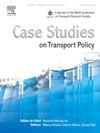When embracing gender equality endangers women: Experiences of public transport female conductors in Gweru Town, Zimbabwe
IF 2.4
Q3 TRANSPORTATION
引用次数: 0
Abstract
This article examines the experiences of female conductors in the public transport sector, particularly the parastatal, Zimbabwe United Passenger Company (ZUPCO) regarding gender equality and women empowerment using the case of Gweru town. It employs the concept of women empowerment as its analytical framework and is based on qualitative research methods involving in-depth interviews with 15 participants comprising female conductors and male drivers. The article argues that the implementation of gender equality policies in the public transport sector without addressing misogynistic attitudes driven by patriarchal norms endangers women rather than empowering them. It found that ZUPCO female conductors experienced humiliating informal initiation into the job, negative labelling, inability to reconcile work and family and sexual abuse and harassment, which undermined the noble goal of enhancing gender equality in the public transport sector. Regardless of these negative effects, female conductors also enjoyed some degree of empowerment through employment and monetary gain, which gave them economic independence. The article concludes that the negative outcomes of embracing gender equality through women’s employment in the public transport sector outweighed the benefits.
当拥抱性别平等危及妇女时:津巴布韦格韦鲁镇公共交通女售票员的经历
本文以格韦鲁镇为例,研究了公共运输部门,特别是半官方机构津巴布韦联合客运公司 (ZUPCO)的女售票员在性别平等和妇女赋权方面的经验。文章采用妇女赋权概念作为分析框架,并以定性研究方法为基础,对 15 名参与者(包括女售票员和男司机)进行了深入访谈。文章认为,在公共运输部门实施性别平等政策时,如果不解决由父权制规范驱动的厌女态度问题,就会危及妇女,而不是增强她们的权能。文章发现,ZUPCO 的女售票员经历了羞辱性的非正式入职、负面标签、无法兼顾工作和家庭以及性虐待和性骚扰,这些都破坏了在公共交通领域加强性别平等的崇高目标。尽管存在这些负面影响,但女售票员也通过就业和金钱收入在一定程度上获得了权力,从而实现了经济独立。文章的结论是,通过妇女在公共交通领域就业来实现性别平等的负面影响大于其带来的益处。
本文章由计算机程序翻译,如有差异,请以英文原文为准。
求助全文
约1分钟内获得全文
求助全文

 求助内容:
求助内容: 应助结果提醒方式:
应助结果提醒方式:


